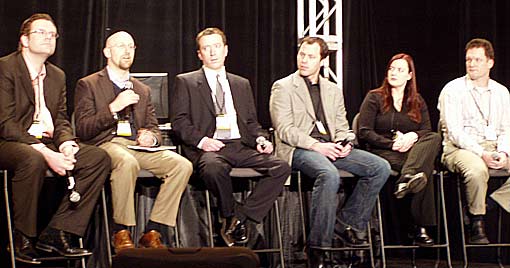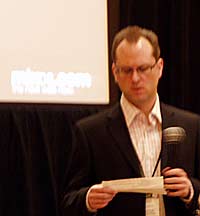Mix06 live (8): Beyond the banner
What's going on today in online advertising, and what will be the next hot thing?

Bant Breen, Jason Rapp, Ron Belanger, Jeff Lanctot, Jennifer Sleg, Jed Nahum
Tags: Microsoft - Mix06
David Jakubowski (Microsoft), moderator
Jason Rapp (New York Times): Standards in measurements, streaming formats etc. are needed. Advertising is a mixture of art and science. We're focusing on the science now, but let's not forget the art. Mashups are a good thing. Our newspaper is a homepage-dominated site, but more and more our traffic is coming from elsewhere: search, blogs, RSS feeds. There is a danger: entire articles are copied on some of these sites, that's a legal issue. But the mixing and mashing up is a good thing. We have some aggregative products ourselves. The editing function adds value to it. On podcasting: we have 17 podcast channels, we have one sponsor.
Ron Belanger (Yahoo): We cannot confuse direct response marketing with branding. Measurement will be the first step. Behavioural targeting is interesting, but segmentation adds complexity. For us, volulme is more important than segmentation. For us, it matters which channel is important for which brand. Television is still getting a disproportionate part of the advertising budget because the creative part is still promoting television. Compare that to interactive games with advertising: we found that users are spending 12 minutes on such a game. Imagine what advertisers would have to pay to get a 12-minute television commercial! On search engines: consumers like the diversity of search engines. There's enough space for three big search engines to coexist. We have solutions for the small market place, we have local portals, you can start an advertising campaign for as less as 10 dollars. On the acquisition of del.icio.us: Search 3.0 will be on targeting, organizing and targeting content on a community basis. Tactically, it's one more slice of segmentation.
Jeff Lanctot (Avenue A - RazorFish): Google gets a lot of attention for the auction model. They brought the accountability in the market. There will be a window of time in which new emerging models will not be accountable, e.g. podcasting. But the time will come where they will have to be accountable. On behavioural targeting: it's just about segmentation of the user base to get more effective targeting. Not enough advertisers are telling a story. We have to engage the user, otherwise we fail. We have fallen down on that side! We need better tools to measure and track word-of-mouth marketing. Advertising on blogs is about the transformation of passion into influence. On search engines: users will give search engines permission to know their behaviour. Once we give that permission, it will be hard to switch from one search engine to another. On podcasting: we need dynamic ad insertion capability, with better tracking.
Jennifer Sleg (JenStar, JenSense.com): Behavioral targeting converts very well. On the flipside, people are concerned about a Big Brother watching their behaviour. The creep factor... I still believe that behavioural targeting will be the next big thing. Banner blindness is a good thing, it keeps innovation going. On blogging: some bloggers have found their niche market and are making money. Tight targeting is essential here, but the blog has to be about a subject where advertisers are willing to pay for. On search engines: each of the big three have someting unique.
Jed Nahum (Microsoft, Adcenter platform): We will have to agree on standards, text lengths etc. It would be good if we could agree on API standards. Online advertising is not well suited for small business, but software solutions will make that better.


